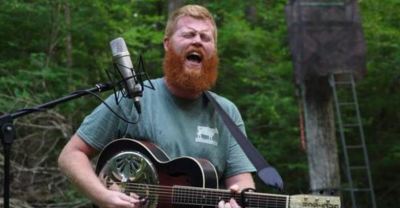‘Rich Men North of Richmond’ Oliver Anthony reveals who he really is

Just one hour east of Lynchburg, Virginia, lays a small, rural, unassuming town: Farmville.
Unless you live in the area, you had probably never heard of Farmville — that is until recently when Oliver Anthony put it on the map with his viral hit single, “Rich Men North of Richmond.” Much can be said of Oliver Anthony, or “Chris” as he humbly identifies, including personal struggles that he has transparently shared about since his viral video, and I’ll dive into some of that in this article.
In a truly grassroots fashion, Oliver Anthony grabbed a guitar and microphone, stood in the Virginia backwoods, and played his heart out, capturing the hearts of millions of Americans overnight as his song dominated social media and topped all the major charts.
Because when millions of hardworking, downtrodden, working-class Americans — white, black, Christian, conservative, or whatever their politics may be — heard this man sing, they knew that he was singing about them.
The lyrics of “Rich Men North of Richmond” tap into an uncomfortable and often unspoken — and rarely so soulfully sung — truth about life in our country right now: It’s rigged against the common man. The lyrics of his song explore the themes of the forgotten man in America: the struggle to make ends meet and the pervasive influence of corrupt politicians and elites. You know, the ones who live in Washington, D.C., that little area of the map just a 100 miles north of Richmond.
The mournful song is an unfiltered, gritty look into the reality of many hardworking Americans who find themselves overshadowed and forgotten. The lyrics paint a vivid picture of individuals struggling to survive in an oppressive society, where wealth and power reside in the hands of a privileged few. And they use some strong language to deliver the gravity of his simmering frustration with the situation. Anthony’s poignant words bring to light the dire consequences of a system that has broken the backs of those “working overtime” for crummy pay and who face increased marginalization in American society.
He wears his heart on his sleeve, setting its message to a haunting bluegrass country tune, singing:
“I’ve been sellin’ my soul, workin’ all day
Overtime hours for bull—- pay
So I can sit out here and waste my life away
Drag back home and drown my troubles away
It’s a —- shame what the world’s gotten to
For people like me and people like you
Wish I could just wake up and it not be true
But it is, oh, it is
Livin’ in the new world
With an old soul
These rich men north of Richmond
Lord knows they all just wanna have total control
Wanna know what you think, wanna know what you do
And they don’t think you know, but I know that you do
‘Cause your dollar ain’t —- and it’s taxed to no end
‘Cause of rich men north of Richmond”
These verses encapsulate the frustration and desperation experienced by those who feel neglected and left behind, particularly in rural America, the Rust Belt, and Appalachia. The stark juxtaposition between the lives of the privileged and the struggles of the forgotten man highlights the growing divide in American society, where the elite seem oblivious to the hardships faced by the majority.
Clearly, “Rich Men North of Richmond” has struck a chord with listeners all over the country. Its immense popularity can be attributed to its ability to give voice to the shared frustrations of Americans all across the political divide. The song’s raw emotions and relatable narrative resonate with those who feel disconnected from the decision-makers and the true power of the nation. It serves as a rallying cry for change and demands a re-evaluation of the values that govern our society.
In the last week, Anthony has gone from an obscure factory worker to one of the most well-known men in America. On Thursday, he took the time to “introduce himself” to his new fans on Facebook, sharing his deeply moving personal story that is full of setbacks, sin, repentance, and hope. He wrote:
“People in the music industry give me blank stares when I brush off 8 million dollar offers. I don’t want 6 tour buses, 15 tractor trailers and a jet. I don’t want to play stadium shows, I don’t want to be in the spotlight. I wrote the music I wrote because I was suffering with mental health and depression. These songs have connected with millions of people on such a deep level because they’re being sung by someone feeling the words in the very moment they were being sung. No editing, no agent, no bull—-. Just some idiot and his guitar. The style of music that we should have never gotten away from in the first place.
So that being said, I have never taken the time to tell you who I actually am. Here’s a formal introduction:
My legal name is Christopher Anthony Lunsford. My grandfather was Oliver Anthony, and “Oliver Anthony Music” is a dedication not only to him, but 1930’s Appalachia where he was born and raised. Dirt floors, seven kids, hard times. At this point, I’ll gladly go by Oliver because everyone knows me as such. But my friends and family still call me Chris. You can decide for yourself, either is fine.
In 2010, I dropped out of high school at age 17. I have a GED from Spruce Pine, NC. I worked multiple plant jobs in Western NC, my last being at the paper mill in McDowell county. I worked 3rd shift, 6 days a week for $14.50 an hour in a living hell. In 2013, I had a bad fall at work and fractured my skull. It forced me to move back home to Virginia. Due to complications from the injury, it took me 6 months or so before I could work again.
From 2014 until just a few days ago, I’ve worked outside sales in the industrial manufacturing world. My job has taken me all over Virginia and into the Carolinas, getting to know tens of thousands of other blue-collar workers on job sites and in factories. I’ve spent all day, everyday, for the last 10 years hearing the same story. People are SO —- tired of being neglected, divided and manipulated.
There’s nothing special about me. I’m not a good musician, I’m not a very good person. I’ve spent the last 5 years struggling with mental health and using alcohol to drown it. I am sad to see the world in the state it’s in, with everyone fighting with each other. I have spent many nights feeling hopeless, that the greatest country on Earth is quickly fading away.”
He closes by saying, “Just like those once wandering in the desert, we have lost our way from God and have let false idols distract us and divide us. It’s a — shame.”
Along with the clearly Christian overtones of Anthony’s life and struggle, it was remarkable to see him open up his first big live show since his viral hit by reading from the Bible. Before he played the song that everyone came to hear, he held his Bible and read Psalm 37:12-20, which speaks about God’s coming judgment on wicked and unjust rulers who use their power to exploit — rather than serve — those under their authority.
From a Christian worldview, “Rich Men North of Richmond” sheds light on the biblical principles of justice, compassion, and the responsibility of government to act righteously, according to God’s standards. The corruption and indifference portrayed in the song echo the biblical warnings against the idolatry of wealth and power. The Bible consistently reminds believers of the dangers of greed and the obligation to use resources and influence to uplift others.
In Matthew 23:23, Jesus rebukes the Pharisees, saying, “Woe to you, teachers of the law and Pharisees, you hypocrites! You give a tenth of your spices — mint, dill, and cumin. But you have neglected the more important matters of the law — justice, mercy, and faithfulness.”
When you pull the camera back, Anthony’s success has been truly astounding. It speaks to the truth that America is still a land of amazing opportunity, even if that opportunity seems to be fading fast. It conveys the deep-seated sense of despair that so many feel right now — that the America they know and love, that their parents and grandparents grew up in, might be gone for good.
It’s a heavy burden to be an old soul living in a new world. But Anthony’s song helps make that burden just a little bit lighter. For all of its dark notes of distress, it carries with it a ringing, resonating register of hope — hope that America might once again be the greatest nation on Earth.
How can we play our part in this cultural moment to bring about that change? Not by writing another viral hit, but by following in Anthony’s footsteps in prayer. We hit our knees and ask for God’s forgiveness and blessing on our new world, so that we might know Christ and make Him known. We remember that even if the rich men north of Richmond never answer to us, they will answer to God.
And that is comfort enough for everyone who “Wish I could just wake up and it not be true.” Because one day it won’t be true — the day when God makes all things new, just like He promised.
Originally published at the Standing for Freedom Center.
William Wolfe is a visiting fellow with the Center for Renewing America. He served as a senior official in the Trump administration, both as a deputy assistant secretary of defense at the Pentagon and a director of legislative affairs at the State Department. Prior to his service in the administration, Wolfe worked for Heritage Action for America, and as a congressional staffer for three different members of Congress, including the former Rep. Dave Brat. He has a B.A. in history from Covenant College, and is finishing his Masters of Divinity at The Southern Baptist Theological Seminary.
Follow William on Twitter at @William_E_Wolfe




























